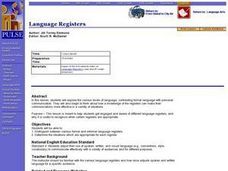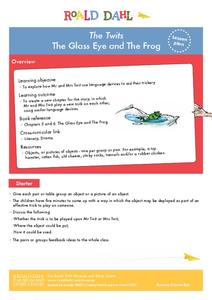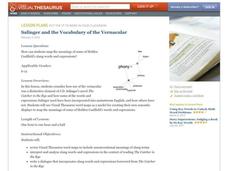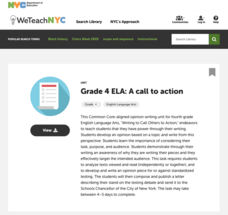One Stop English
A Lesson on Register
The classroom might not be the best place for informal language, but it's a great place to teach middle and high schoolers how to identify the correct language register for their audience. A short lesson on formal and informal language...
University of Arizona
Language Registers
Do you speak to your parents the same way you speak to your friends? The differences between formal and informal language are highlighted in this exercise. Groups are asked to select a scenario and script different dialogues that might...
College Board
AP® Psychology Cognition and Language
I can remember what happened five years ago, but I can't recall what I did last week! High school psychology students analyze how memory, cognition, and language impact one another. Hands-on activities, memory exercises, and research...
British Council
Learning English through Short Stories
Use short stories to teach English? Yes! Designed as a professional development opportunity for English language teachers, the ideas in this booklet can easily be adapted to advanced ESL/ELL classes.
Curated OER
Understanding language registers as a means to more effective communication
Students become familiar with registers of language through class discussion and exposure to examples of a common fairy tale written in two different registers. Working in small groups, students then translate a story into two different...
Curated OER
Diction: Formal and Informal Language
Coke or Pepsi? Is it the taste or the advertising that determines preference? As part of a study of diction, class members examine two passages, one formal and one informal, about Coca-Cola and Pepsi. In addition, they consider word...
Curated OER
Formal and Informal Language
Words carry connotative baggage and some suitcases are bigger than others. Learners consult the Chambers School Dictionary to identify the formal, informal or slang words used in a series of exercises.
Roald Dahl
Matilda - Miss Honey and The Trunchbull
As the instructor reads aloud several quotes from five chapters of the story Matilda, class members mime their interpretation of the scenes. Then, after reading "Miss Honey" and "The Trenchbull" (chapters seven and eight), the class...
Curated OER
Understanding the Poem
Practice literary analysis with your poetry pupils using the mysterious narrative poem "The Listeners." They examine the archaic language and answer 12 comprehension and analysis prompts. Foster creativity with these referential...
Roald Dahl
The Twits - The Glass Eye and the Frog
What do a pair of stinky socks and a toy hamster have in common? The third lesson in an 11-part unit designed to accompany The Twits by Roald Dahl uses silly objects to teach about figurative language. Zany pranks and role play make for...
Curated OER
Matthew Henson
Discuss the work of Matthew Henson, an African American who traveled to the North Pole with Robert Peary. After reading the story "Matthew Henson" by Maryann N. Weidt, learners answer questions by drawing inferences and conclusions,...
Roald Dahl
Charlie and the Chocolate Factory
You can't read Roald Dahl's Charlie and the Chocolate Factory without craving the rich treats described in Dahl's vivid prose. Young writers try their hands at sensory language with a lesson plan that prompts them to write about their...
Curated OER
From Formal To Slang
Tenth graders define the term slang, explaining its various social, historical, and racial contexts, so as to articulate when it can be appropriately used as a means of effective communication. They use their own personal slang lexicon,...
Curated OER
Writing in a Foreign Language
It seems that this presentation was designed for future educators, particularly those teaching a foreign language. Basic reading, writing, and organizational skills are presented, encouraging a discussion of strategies amongst your...
Shmoop
ELA.CCSS.ELA-Literacy.SL.9-10.6
Cover language registers so that your class members can adapt their speech when necessary. The two example activities are interactive and involve authentic interaction. Test your pupils' understanding of speech adaptation with one or...
Curated OER
Language and Social Culture
"Language and culture are so related that you cannot understand one without a knowledge of the other." The 37 slides in this presentation are meant to reinforce the points made in a lecture about language, language vareities, language...
Curated OER
Salinger and the Vocabulary of the Vernacular
Writers explore vocabulary and expressions used in the English language. They use visual word maps to become aware of the different uses of words which will allow them to more readily interpret texts. Then they listen to/read excerpts...
New Class Museum
Lesson: Emory Douglas: Decoding Images and Vocabulary Activity
To better understand the work of Black Panther logo artist Emory Douglas, learners define literary devices. They define a series of words such as metaphor, simile, and assonance, then place an example of that device found in Emory...
Roald Dahl
Matilda - Throwing the Hammer
Full truth, or an exaggeration? How can you tell when a storyteller is exaggerating a story? Readers analyze a story told by Hortensia, and identify the exaggerative language she uses. Then, learners write their own narrative story using...
Curated OER
Julie of the Wolves
Have your class practice their comprehension skills using this resource. After reading Julie of the Wolves by Jean Craighead George, learners engage in cause and effect activities, identify story elements and figurative language, and...
Curated OER
Knights of the Round Table adapted by Gwen Ross
Everyone loves the tales involving King Arthur and his knights. After reading Knights of the Round Table by Gwen Gross, learners draw inferences and conclusions, analyze story elements, and discuss figurative language, including...
New York City Department of Education
Grade 4 Literacy in English Language Arts: A Call to Action
You have the power! Scholars learn that they have power of the pen in their writing. After reading and viewing various sources about standardized testing, they express their own opinions about the testing by writing letters to the...
New York City Department of Education
Grade 5 Literacy in English Language Arts: Should the School Day Be Longer?
Scholars read newspaper articles relating to a longer school day and complete note-taking organizers as they read. They then form opinions and complete outlines before writing essays supporting their point of view.
Roald Dahl
The Twits - Dirty Beards
The problem with beards is that they collect a lot of food. The first lesson in an 11-part unit related to The Twits by Roald Dahl explores the hairy jungle that is Mr. Twit's beard. A concluding project has learners create their own...

























